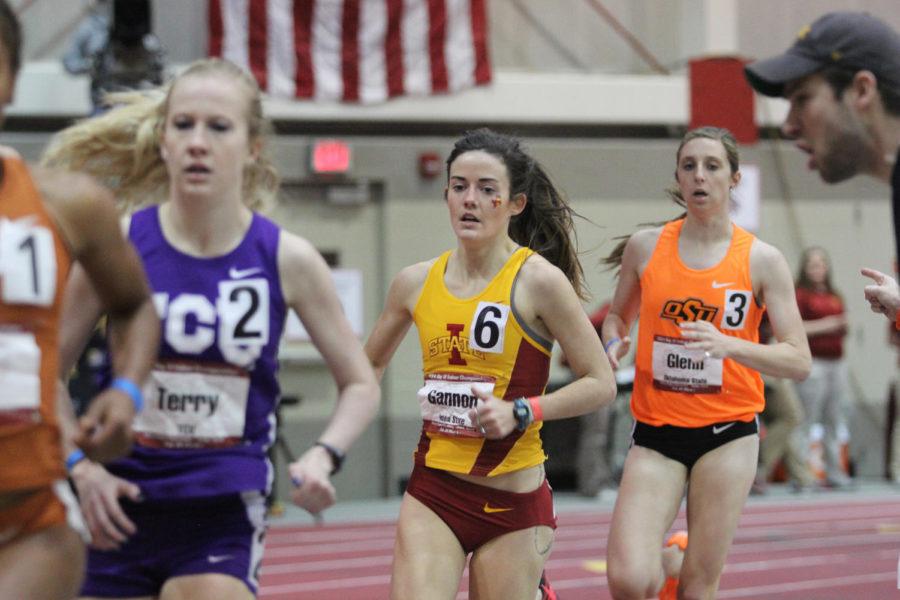ISU switches medley lineup, emerges at top of conference
Maggie Gannon, junior, finished fourth during the women’s 1-mile run. Gannon was a part of the Big 12 indoor track and field finals, and finished with a time of 4:43.73.
March 3, 2014
The Big 12 Indoor Championships featured plenty of “wow” moments.
Ejiro Okoro may have provided the biggest “wow” moment of day one with her finish for the women’s distance medley relay team.
Iowa State’s distance medley relay team featured a lineup that was different than the usual relay team it had ran throughout the season. With Bethanie Brown, the usual anchor of the relay team, running the 5,000-meter race the same day, the Cyclones needed to shift their lineup.
Maggie Gannon stepped into the lineup for the first time this season to run the opening leg, pushing Perez Rotich back to the second leg, Kendra White running her usual 400-meter leg and leaving Okoro to finish out the relay race.
Pushing Okoro back to the anchor leg seemed to pay off as the senior dazzled down the stretch.
Okoro took the final handoff with a 30-meter gap between her and the first place team. With a mile to go, she knew she had plenty of time to play catch up.
“My goal was to just keep on pace, and not go too quickly,” Okoro said. “I just wanted to gradually climb and stay in a position where I could make a move.”
With two laps to go, ISU assistant coach Andrea Grove-McDonough told Okoro to start making her move.
“I heard [Grove-McDonough] yelling that I had to go, so I started pushing,” Okoro said. “Those final 150-meters, I saw that I was gaining so I just dug in and kept pushing and pushing.”
The final straightaway saw Okoro make up roughly 15-meters down the final stretch. The result was Okoro just clipping the Baylor anchor at the finish line by .68 seconds, much to the delight of the ISU fans cheering Okoro down the final stretch.
“In retrospect that was probably our best lineup, because she has such a tremendous kick,” Grove-McDonough said. “I don’t think there is anyone who can out-kick [Okoro] and I also thought if we’re behind, as she proved, she’s probably the one with the best speed down the stretch.”
The decision to move Okoro from her typical 800-meter leg to the one mile anchor leg, was a decision Grove-McDonough had considered all year. With Okoro being so dominant in the 800-meter event, it was hard to consider moving her anywhere else.
“We have been going back and forth all season with whether or not we should do that,” Grove-McDonough said. “We looked at it from all the angles with where we would gain time and where we would lose time with moving her, but it seemed like the best option.”
Okoro, who would go on to win the 800-meter run when she ran the individual event, said it was a little bit unusual not running her typical 800-meter leg of the relay.
“It was kind of weird at first, because I’ve just always ran the 800 [leg],” Okoro said. “This was my first mile in competition, so I wasn’t really use to like the competition speed yet, so that was going through my mind at the start.”
Okoro was successfully able to make the adjustment, running double the normal length of her leg, while still maintaining enough gas to provide the “wow” finish down the final stretch.
While Okoro received a lot of the credit, and rightfully so, for the way she closed out the race, Rotich was forced to make an adjustment by running the 800-meter leg instead of her usual 1200-meter leg, and Gannon was thrown into the event for the first time this season to run the 1200-meter leg.
Running an event for the first time all season in the Big 12 Championship could be a little bit unnerving, but Gannon handled the decision in stride.
“I was really excited … I knew that I was capable of running a strong leg, and I knew that no matter how I ran in the first leg my teammates behind me we’re going to close it out well,” Gannon said.
The coaching moves and the lineup change paid off for the Cyclones, as the distance medley relay team won the Big 12 title in the event.
“It’s like surreal,” Gannon said. “I don’t think it’s really set in yet, but to be able to do it as a team I think is so special, because you need four people on that day to be the best that they can be, so I think that winning the Big 12 championship as a relay team is so much more meaningful than as an individual.”







